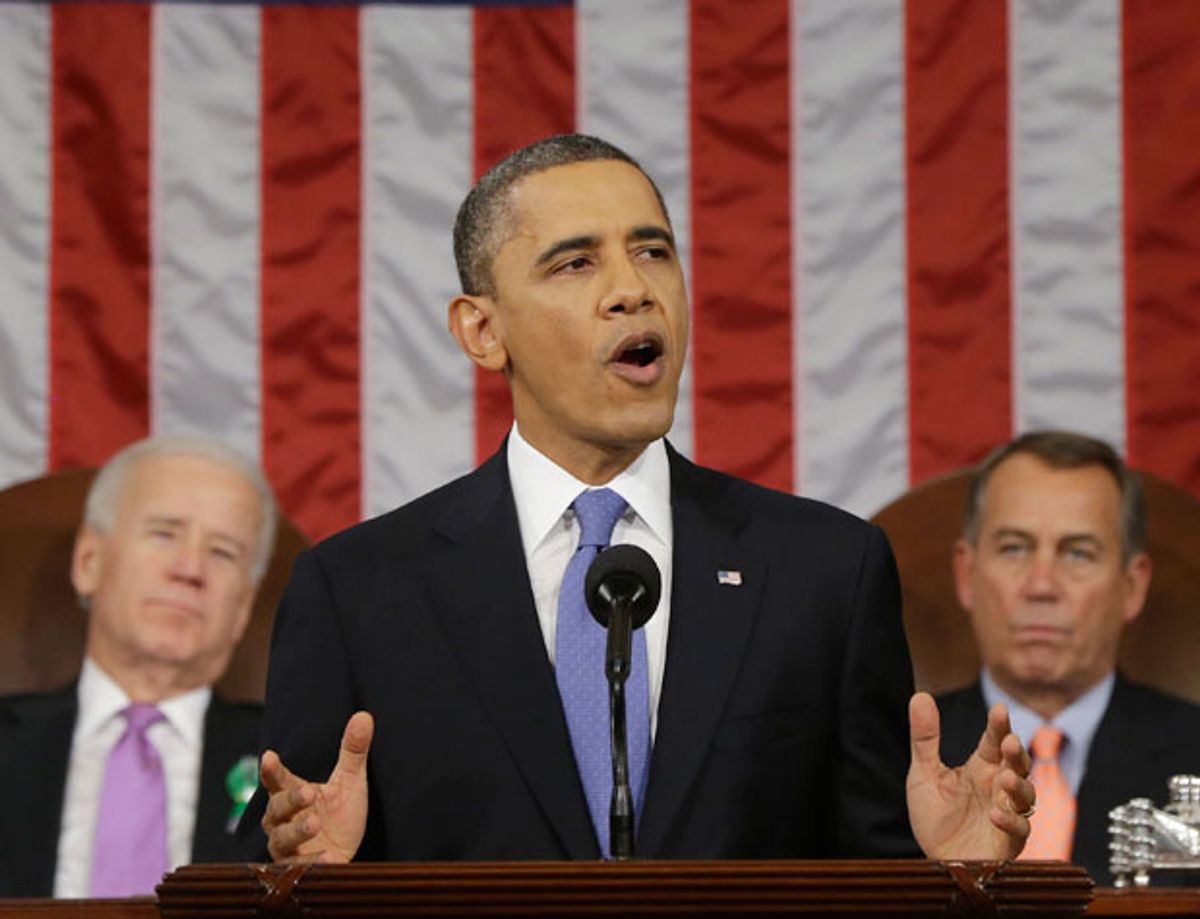Environmentalists and clean energy proponents rejoiced a few weeks ago when President Obama devoted all of eight or nine sentences (depending where you choose to drop some punctuation) on climate change and energy issues during his relatively short second inaugural address. Last night during a much more extensive State of the Union speech, the President went even longer, and with at least a few more specifics, on his plans to combat what many see as an issue that will define his second term. The final count: 34 sentences, give or take.
Other than length, the big change in Obama's rhetoric on energy lies in his willingness to directly confront its relationship to climate change, now that he doesn't need to run for anything ever again. In the past, Obama touted clean energy for its ability to create jobs. This time, he began by noting that the United States produces "more oil at home than we have in 15 years" and then went right at the climate problem:
"But for the sake of our children and our future, we must do more to combat climate change. Now, it’s true that no single event makes a trend. But the fact is the 12 hottest years on record have all come in the last 15. Heat waves, droughts, wildfires, floods—all are now more frequent and more intense. We can choose to believe that Superstorm Sandy, and the most severe drought in decades, and the worst wildfires some states have ever seen were all just a freak coincidence. Or we can choose to believe in the overwhelming judgment of science—and act before it’s too late."
Unfortunately, the speech was still somewhat short on hard, detailed plans. Obama did say, though, that if Congress fails to enact a "market-based solution to climate change"—meaning, something resembling the cap-and-trade bill that passed the House in 2009 but then died in the Senate—he will take executive action to address the issue himself. Of course, there is essentially zero chance of Congress getting its act together on this issue (or most issues, these days), so presumably executive action it is.
The main action Obama could take is one that has been threatened or discussed for several years now: regulating greenhouse gas emissions from major sources like power plants. This would make building new coal plants all but impossible, and could force some dirtier natural gas plants to clean up or close. It would, as well, encourage utilities to meet demand through solar and wind power. Obama could also, by executive order, increase the use of greener fuels in the military, the world's biggest purchaser of petroleum; mandate smart building technologies and other conservation measures for federal buildings; and require that more methane (a potent greenhouse gas) be captured by companies drilling for oil and gas on federal lands.
One of the few specifics offered in the speech did relate to drilling on lands administered by the Department of the Interior. Obama proposed creating an Energy Security Trust, funded by revenues paid by the drilling companies. The Trust would fund research into "technology to shift our cars and trucks off oil for good." It has an appealing symmetry to it: use oil revenues to eliminate the need for oil. And parts of the Obama administration, such as the Advanced Research Projects Agency-Energy, are already working hard on projects with similar goals.
All of these ideas are promising, but it's also impossible to ignore Obama's continued insistence on his "all-of-the-above" strategy when it comes to energy. He still wants to cut red tape and speed up oil and gas permitting; he wants the current natural gas boom to continue; he wants to cut energy waste in homes and buildings by half over 20 years—wait a minute, that one's a good idea (and as I have written about elsewhere, not out of the question).
Clearly, the President remains somewhat scattered in his energy ideas, to the point that it feels like he's trying to please everyone on issues where opposing viewpoints are often unreconcilable. But his willingness to confront the clear dangers of a warming world does stand in stark contrast to those in Congress who still stand in his way. Senator Marco Rubio, in the official Republican Party response to the State of the Union, dismissed decades of science, thousands of scientists, and billions of people who understand the climate-change problem, and he did it with a bizarre non sequitur: "Our government can't control the weather." Perhaps not, but we will soon see if the President doesn't just talk about the weather but does something about it.
Photo via Charles Dharapak/Bloomberg/Getty Images
Dave Levitan is the science writer for FactCheck.org, where he investigates the false and misleading claims about science that U.S. politicians occasionally make.



